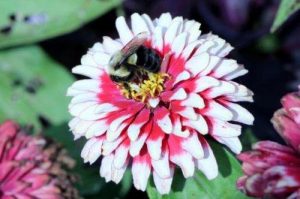
Credit: Lilla Frerichs/public domain
A team of researchers with Charles University and the Czech Academy of Science has discovered a species of bee where males guard a nest while females are off gathering food for their young. In their paper published in Proceedings of the National Academy of Sciences, the group describes their study of Ceratina nigrolabiata and what they found.
Ceratina nigrolabiata, small bluish-black bees live around the Mediterranean Sea. They are somewhat unique in that they do not build nests with large numbers of females taking care of a queen, while drones are off gathering food. Instead, a female builds a small nest inside the stem of a plant where she lays her eggs. Once they hatch, she becomes the lone provider, flying about gathering nectar to bring back to feed her young. The species is unique in another way—when the mothers go off foraging, males that are not even the father of the young stand guard, protecting the young bees in their mother’s absence. In observing the bees, the researchers found that the work by the males was not exactly an act of kindness—doing so gave them a strong chance of mating with the female.
In all, the researchers studied 78 nests, watching each for a period of an hour and a half. They report that in the majority of cases, a male resided in the nest with the female—when she went off to forage, the male placed himself in the doorway, blocking predators (mainly ants) from entering. When the female returned with a load of pollen, the male allowed her into the nest and continued to stand guard while she fed the young. The researchers tested the males by putting ants on the nests—in most cases, the males blocked them from entering the nests. In more extreme cases they actually pushed the ants out of the nest. The researchers also found that the longer the male inhabited the nest, the more likely he was to mate and produce female offspring (unfertilized eggs grow into males). The researchers note that their discovery was the first ever of male bees performing babysitting duty.
Explore further: Evolution: Genetic relatedness doesn’t matter much in forming society
More information: Michael Mikát et al. Polyandrous bee provides extended offspring care biparentally as an alternative to monandry based eusociality, Proceedings of the National Academy of Sciences (2019). DOI: 10.1073/pnas.1810092116